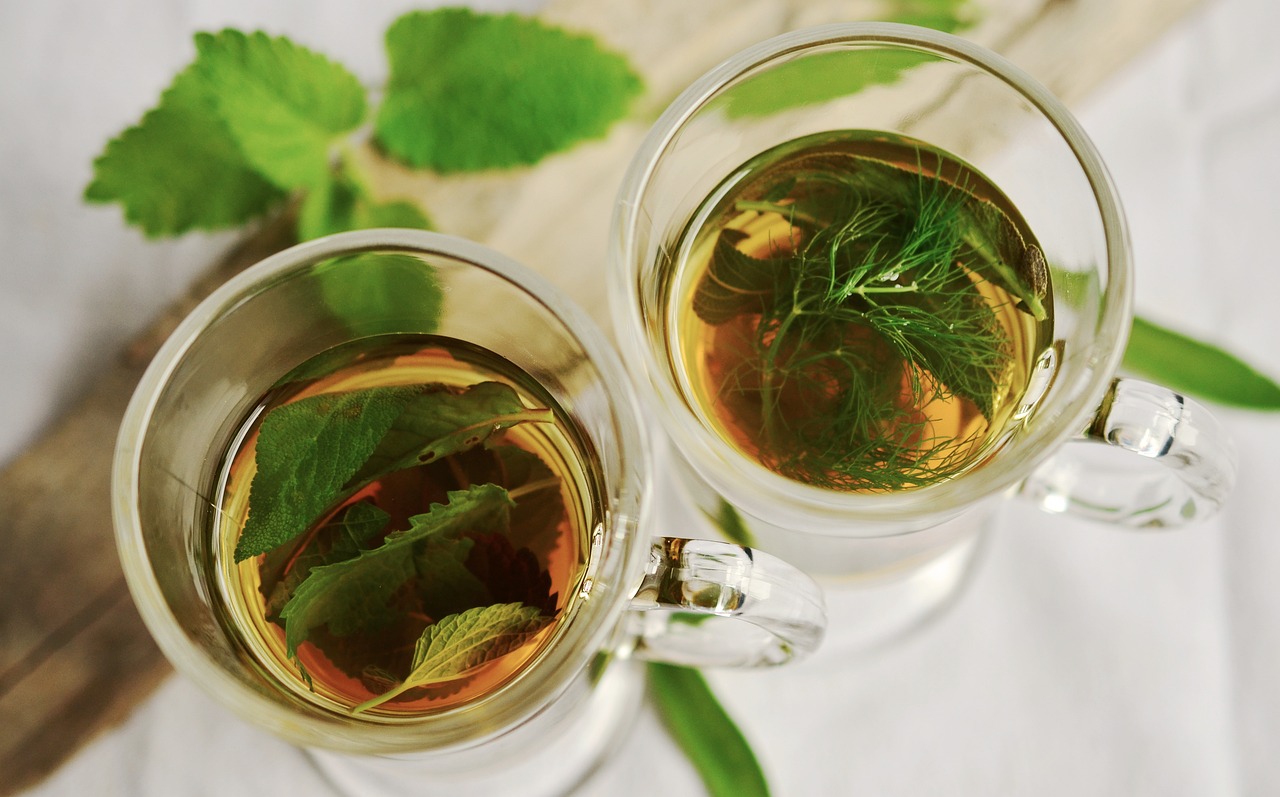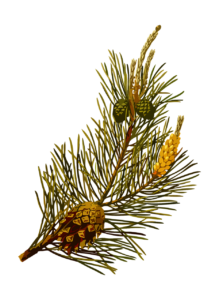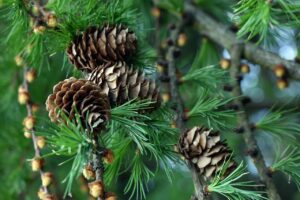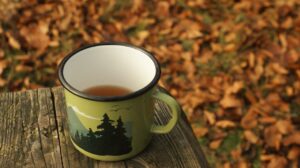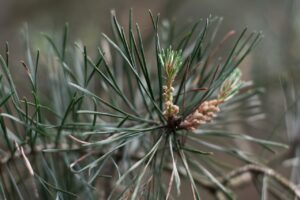Pine needle tea is an herbal tea made from pine needles or the leave of pine trees. It is consumed especially in winter when there is a slight dearth of fresh fruits and vegetables. However, there are many myths surrounding the topic of pine needle tea dangers, benefits, and more.
Countries where it is consumed the most include Japan, Russia, Korea, China, and so on. Also, pine needle tea is quite common in the United States. One of the main reasons behind the easy availability of this tea is that pine trees grow across the globe and throughout the year.
However, out of all the places where pine trees are found, it is in Japan that you find it the most. In Japan, you will notice ample pine trees all around and how the local handicrafts and artwork also bear images and designs of pine needles.
For instance, you can see pine needle-inspired designs in kimonos, hakama, yukata, and many more such apparel patterns. What might be surprising is that many people in Japan use pine needles to brew and make tea and for bathing.
Table of Contents
Pine Needle Tea As A Rich Source Of Nutrition
Pine needle tea has many benefits. It is a rich source of vitamins A and vitamin C. While vitamin A is good for your hair, eyesight, and skin, vitamin C is good for functioning your blood vessels, bones, and cartilage.
Not only this, but vitamin C is also good for hair, skin, and healing of wounds. Having said this, you must also remember that there are several pine needle tea dangers that can be quite detrimental to your health.
As mentioned earlier, pine needle is a rich source of nutrients. Consequently, it has several health benefits. However, apart from its significant medicinal properties, tea is consumed as a beverage today.
Another interesting fact about pine needle is that it comprises multiple bioactive compounds. Some of these are:
- Amino acids
- Flavonoids
- Flavour-related compounds
Pine Needle Tea As Home Remedy
While most people usually have misconceptions about pine needle tea dangers, it is also important to know that this tea can be used to cure many illnesses. For instance, pine needle tea can help cure colds and cough, boost immunity, and cure digestion issues.
It is also a natural painkiller without all the side effects you might otherwise experience when consuming allopathic painkillers.
Is Pine Needle Tea Safe For Consumption?
Pine needle tea is safe for consumption except for a few situations, which we will discuss soon. Multiple varieties of pine needles can be used to make a perfectly delicious and soothing beverage.
Some varieties are listed here:
- Himalayan cedar: Cedrus deodara
- Eastern White Pine: Pinus strobus
- Spruces
- Japanese Red Pine: Pinus densiflora
- Firs
Apart from the above-mentioned, there are many other varieties as well which can be consumed. You should consult with diet specialists or doctors before consuming different varieties of pine needle tea.
Pine Needle Tea Benefits
Scientists have done much research and experiments to understand pine needle extract benefits. One fatal disease that pine needle helps to cure is scurvy. This disorder is caused by the lack of vitamin C. Usually, citric fruits and specific vegetables are a rich source of vitamin C.
Some of the symptoms of scurvy are:
- Gum disease
- Fatigue and tiredness
- Longer time to heal wounds
- Osteoporosis in children
Apart from the above, there are many other pine needle tea benefits. However, there are many other benefits that most people are unaware of. These advantages of pine needle tea include the following:
Antioxidant properties
After much research and experiments, scientists have inferred that pine needle contains some properties that can protect the cells in your body from damage.
Anticancer properties
Scientists have conducted multiple research studies on animals and cells to conclude that this tea can positively impact cancer patients. However, no such studies have been conducted on humans. Hence similar conclusions cannot be drawn about cancer cures in humans.
Anti-aging effects
Studies have also shown that molecules present in pine needle tea can attach to certain specific receptors. These receptors are known for their anti-aging properties too.
Protection of the heart
This is connected to the presence of proanthocyanidins, also known in Pinus densiflora.
Immune system modulation
Like the above point, this is also associated with proanthocyanidins.
So, these are all the benefits you can get if you consume pine needle tea regularly. Apart from those mentioned above, it is obvious that this tea positively impacts your skin, hair, bones, and overall health. Hence, now it becomes imperative that you know how to make pine needle tea.
Pine Needle Tea Recipe
The recipe for pine needle tea is super easy. Making it yourself is the best option, as it is not available in a ready-to-drink form. Since pine needles are usually available throughout the year, you can also collect pine needles on your own.
Following are the steps that you need to follow:
- Either buy or pluck pine needles from an edible species of pine trees. Allow the needles to harvest. You can either use the entire batch or some of it to make your tea. Remember, the more needles you put, the stronger your tea will be. Don’t worry if you decide to use only some of it and save the rest. Though the remaining needles will get dried, they will still be useful enough to make another strong cup of tea.
- Take a pot and pour water. The quantity of the water will depend on the number of people you make it for. Let the water reach a pre-boiling stage. Wait till the water gets partially boiled.
- Once the water reaches its pre-boiling stage, add the needles. Let it all simmer for a few minutes. It is fine even if the water gets boiled before adding the needles. However, in that case, some nutrition from needles will get drained.
- Once you smell a strong scent of pine from the water, you will know it’s done. Strain the water out, and put away the needles. Serve the tea in mugs to feel its soothing effect. If you find it too bitter, then you can always add a little sugar or honey. However, honey would be the healthier option here.
Who All Should Avoid Pine Needle Tea?
While pine needle tea benefits are endless, there are also some harmful effects of the tea. This is not to generalize; certain people should completely refrain from consuming it.
Some such people are as follows:
Those with allergies
Those who are allergenic, especially pine pollen, should avoid pine needle tea. This is because it can cause cross-reactivity with other allergens and thus lead to severe repercussions.
Pregnant women and nursing mothers
Pregnant women should avoid pine needle tea completely. It can lead to uterine contractions and miscarriage if it gets too serious. Also, women who are breastfeeding should avoid the tea as well. This is because the tea compounds can easily transfer to the infant through breast milk and create major problems.
People on specific medications
People on diuretics, diabetes medicines, or anticoagulants should avoid pine needle tea. They can also consult with their doctors for further suggestions. The compounds in the tea can easily interact with the compounds of the drug and hence cause severe or even fatal chemical reactions.
Are Pine Needles Poisonous?
While pine needles have many health benefits, there are certain harmful toxins that might be present in the needles. This can also vary from one species to another. Hence, it is significant that you understand how to differentiate between edible and inedible species.
Unsafe species
As mentioned earlier, quite a few pine species are unsafe for consumption. Some of these include yew trees, Ponderosa pines, and Australian pines. These needles can contain toxic substances, leading to serious health issues.
Environmental Pollutants
Pine needles can often collect pollutants from their surrounding environment. These pollutants are heavy metals or industrial chemicals. This can easily contaminate the needles, and eating such needles can put you at life risk. This is why you must look for pine needles in neat and clean areas, away from pollution.
What happens if you consume toxic pine needle tea?
If you happen to consume toxic pine needle tea, there can be various repercussions to it. Some of these are nausea, dizziness, respiratory diseases, and vomiting. If you experience these symptoms immediately after consuming pine needle tea, you may have consumed poisonous pine needle tea. Hence, the best thing is to seek medical attention right away.
How to consume pine needle tea safely?
To avoid pine needle tea dangers and keep yourself safe, you must be mindful of a few factors:
Correct preparation
Firstly, you must identify safe pine species. Even if the needles are safe for consumption, wash them thoroughly. If not washed properly, the needles can contain harmful chemicals or substances. Focus on steeping the needles properly and avoid boiling them vigorously.
Frequency and quantity of consumption
This is another factor to be particular about. Ensure you keep your daily consumption limited to only 1-2 cups. Also, avoid over-steeping, as that will make the needles lose their nutritional value.
Look for side effects
If you are drinking pine needle tea for the first time, focus on your health for some time after that. If you identify any symptoms at all, get in touch with your doctor immediately.
Frequently Asked Questions (FAQs)
1. What are some risks of drinking pine needle tea?
Pine needle tea can be risky to drink only when the needles belong to an inedible species. Also, ensure that you clean the needle properly before using them for consumption.
2. How often should you drink pine needle tea?
You can drink this tea every day. However, limit your consumption to only 1-2 cups per day and not more than that.
3. Who should not drink pine needle tea?
Pregnant women and nursing mothers should ideally avoid pine needle tea completely.
4. Do pine needles have medicinal properties?
Pine needles can treat colds, coughs, phlegm, and sinus infections.
5. What are some scientific benefits of pine needle tea?
Pine needle tea is rich in vitamins C and A. Hence it is a rich source of multiple nutrients that also have major health benefits.
6. Is pine needle tea beneficial for your kidneys?
Pine needle tea helps flush out your kidneys and keep them clean and functional.
7. Is pine needle tea toxic?
Pine needle tea is ideally not toxic if you use edible pine needles to make the tea. However, if you use inedible species of pine needles, it is extremely harmful.
Final Thoughts
Now you know all the benefits and pine needle tea dangers. Only consume this beverage if you are eligible pertaining to your health condition. You must avoid it at all cost when pregnant, expecting, or trying to get pregnant.
